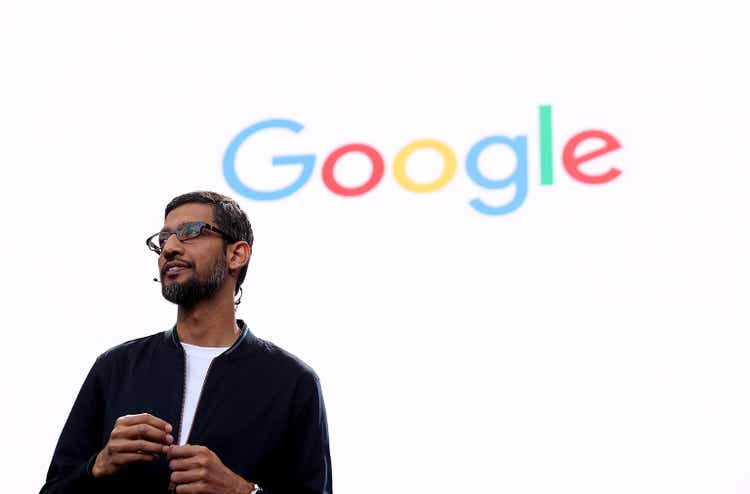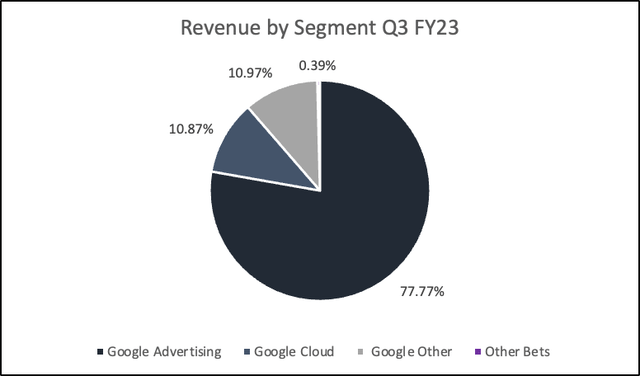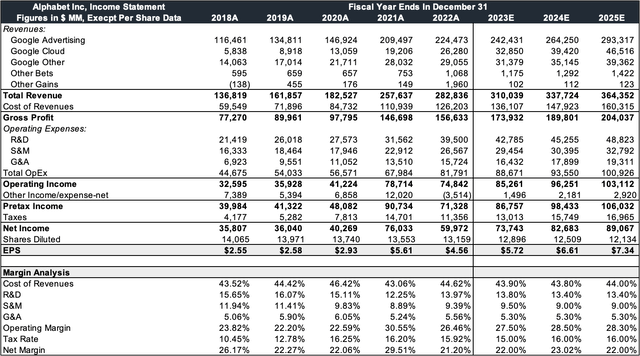
Justin Sullivan
Investment Thesis
Alphabet (NASDAQ:GOOG) (NASDAQ:GOOGL) needs no introduction. The company is the main beneficiary of the shift to the digital world. The firm experienced a nasty sell-off post-earnings due to a missing cloud revenue calculate by ~$200 million. Although the stock has rebounded since then, it seems as if investors are still worried Alphabet might underperform in the future. I believe otherwise, and I will explain why. I have a price target of $152 by the end of FY2024.
If we look at GOOG’s revenue sources, most of it stems from advertising, which is made out of the Google seek engine, YouTube, and Google network.

Created by the author
Google’s seek engine has a 91% market share and good long-term prospects, such as continued smartphone penetration and partnerships with top-selling smartphones. Additionally, most phones have Google’s seek engine as a default option, and some never bother to change it because it is smooth and effective. The digital advertising industry is still substantial; according to Statista, it is expected to grow by 7.2% from 2023 to 2028.
YouTube is the same story. I don’t see any other platform competing with it. I expect the company to benefit from the long-term tailwind of many kids and young teenagers wanting to become YouTubers and the rise of “side gigs” because the platform offers the chance to work from anywhere in the world and earn a good chunk of money. I have noticed this with my young brother, who is 14 years of age; he barely watches TV because YouTube has it all. Plus, the smartphone user base is still expanding and is projected to accomplish 5.13 billion in 2028, up from 4.74 billion in 2022.
Additionally, GOOG treats its creators better than most platforms. It splits revenue with creators 50/50. This has led to increased productivity and a larger user base. YouTube generates almost as much revenue as Netflix. The only thing preventing online platforms from fully taking over TV cable is sports, and YouTube’s recent deal with the NFL will encourage enhance user retention and attract a new customer base.
Now, let us take a dive into Google’s cloud services, the segment that caused the stock to drop by roughly 9% post-Q3 earnings. Google Cloud reported earnings of $8.4 billion, and the market expected $8.6 billion. Regardless of missing expectations, the segment still posted 22% growth YoY, compared to AWS 12% and Azure 19%. Additionally, AWS sales also missed estimates ($150 million) in AMZN’s latest quarter.
Personally, I believe the street’s estimates might have been too high for Google Cloud, especially in a world with 5.25% interest rates; businesses would rather keep a cash reserve than invest in the cloud, or perhaps the company has reached a point where 30-40% growth is over, or at least until economic conditions get better. Over the past four years, Google’s cloud segment has grown at an annual rate of 46%, which is more than Amazon’s “AWS” 33% and Microsoft’s “Azure” 23%.
Additionally, GOOG’s board of directors has deep industry knowledge and go through, with an average tenure of 13.7 years, with its co-founders still a part of it and holding a significant stake in the company. CEO Sundar Pichai holds more than $240 million worth of GOOG shares and options.
Both Larry and Sergey have been able to steer the business in the right direction and alter to new trends, such as acquiring YouTube and Android. Developing Gmail, Google Maps (the most downloaded travel app), and Google Cloud. I believe they will do the same thing with AI and machine learning.
Note: As I’m getting this article ready for publication, GOOG unveiled the launch of its large language model (“LLM”) called Gemini, the AI language model that the company hopes will challenge OpenAI’s ChatGPT. It includes a suite of three different sizes:
- Gemini Ultra is the largest and most capable model for highly complex tasks.
- Gemini Pro is the best model for scaling across a wide range of tasks.
- Gemini Nano is the most efficient model for on-device tasks.
What can it do? Well, Gemini can generalize and seamlessly comprehend, function across, and combine different types of information, including text, code, audio, image, and video. It can be used in data centers and on mobile phones. Gemini Pro will first be available on “Bard” on December 13th across 170 countries.
I believe the release of Gemini is definitely a big deal, not just for GOOG but for the whole industry; GOOG can also incorporate its LLM to be used on its various applications and software, such as Google Chrome, seek, YouTube, ads, and more. This would also enable better cost management, as a JPM analyst said.
Valuation
My price target is based on 23.00x of FY2024 EPS of $6.61. I assumed revenue to compound at an average rate of 9% from FY2022-FY2025, underpinned by a 9% growth rate in advertising, 11% in Google Cloud, 21% in Google Other, and 10% in Other bets. My revenue assumptions are driven by price increases, continued market penetration, and market growth.
I expect shares outstanding to reject by 2.67% annually over the same period, driven by aggressive buybacks. GOOG is expected to spend roughly $60 billion annually on share repurchases. For expenses, I derived my assumption from historical figures, given that they haven’t changed in a major way over the past few years.
As I’m writing this, the stock is sitting at $135. GOOG is trading at a forward P/E of 24.11x the FY23 consensus of $5.74 and 20.76x the FY2024 consensus of $6.67. On a trailing free cash flow basis, the stock yields over 5.09% relative to its enterprise value.

Author
Investment Risks
In 2017, 2018, and 2019, the European Commission imposed fines on Google of $2.7 billion, $5.1 billion, and $1.7 billion for infringing European competition law. GOOG is also facing domestic cases, mostly antitrust investigations and lawsuits, with one filed in late January 2023 by the U.S. Justice Department.
New laws that restrict data collection could also hurt the company. Google thrives because of its data; the more data they have, the more advertisers they can attract. ChatGPT also poses a threat, but with the recent launch of Gemini, which encourage improves “Bard,” I believe the company finally has a fighting chance.
GOOG competes with conglomerates such as Microsoft (MSFT), Amazon.com (AMZN), and Apple (AAPL) in every aspect of its business, including advertising, cloud computing, products, and more. GOOG is a very attractive company, but it does have risks.
Takeaway
All in all, Alphabet is a dominant business with leading positions across different sectors. Over the past year, the stock hasn’t performed as well as its peers because of increased competition and the fear of losing market share. But I believe the company will come out stronger on the other end, given its strong cash flow generation and leadership.



